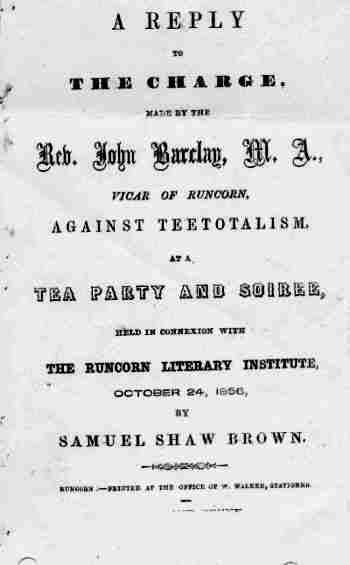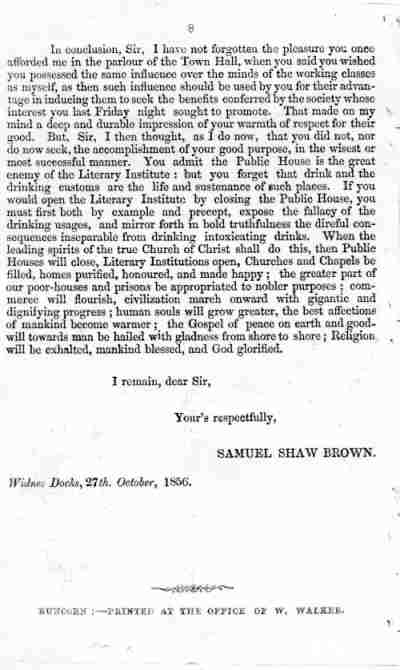TEMPERANCE IN VICTORIAN HALTON, RUNCORN AND WIDNES
The Arguments
Although there were quite a number of good citizens committed to fighting against the ill-effects of the prevailing working class culture and the misuse of alcohol, Victorian commentators were not always in agreement :
On the 24th October 1856 the then vicar of Runcorn, the Reverend John Barclay M.A. gave a talk at a Tea Party and Soiree held in connexion with the Runcorn Literary Society in which he appeared to regard teetotalism as a "prejudiced and one-sided system". His comments prompted one Samuel Shaw Brown to write and publish a letter of reply on 27th October 1856. This letter was, interestingly, printed by the same W. Walker who produced the pamphlet in 1832.

Brown's letter implies that the Rev. Barclay, although a good and honourable man, was doing the cause of abstinence a great disfavour by belittling teetotalism whilst at the same time, curiously, exposing the virtues of abstinence. The letter is quite long so I will not transcribe it in full. However the following extract allows some of its flavour to be sensed.
"The system you denounce with one breath, while you applaud its happy effects with the next, is a great moral structure built on God's natural unchangeable laws, consecrated by holy writ and hallowed by the social and moral regeneration and exaltation of tens of thousands of once degraded humanity. What clergyman will risk his reputation, even with man, by denying that from the mass of moderate drinkers, the dark, polluted, loathsome ranks of the drunken are recruited? While from the published evidence of eminent men of all classes of society (Deacons and clergymen of all denominations included), the temperance movement has lifted its thousands from the sewers of moral filthiness and cleansed them from the vice of drunkenness yea, has induced the very vermin of human society to creep from their inlets of darkness and infamy into the light of truth; where, being found by teachers of diviner things, they have been led to the altar of God, rejoicing in teetotalism as the first though not the consummating instrument of their salvation."
For anyone who is researching the history of Runcorn, reference to Bert Starkey is obligatory. In his book Old Runcorn he tells of "an abundance of public houses in Victorian Runcorn: forty-five hotels and beer houses in 1869…". By 1891 this had increased to 101 (including 7 in Weston and 7 in Halton). White's Directory for 1860 lists 49 beer houses and 15 inns and taverns.

Bert comments that "whilst excessive drinking was no greater a problem in Victorian Runcorn than it was in other small towns, nevertheless intemperate spending on drink constituted a serious social problems". Both he and Ray Miller refer to an obituary to a local magistrate PHILIP WHITEWAY that appeared in the Warrington Guardian on 23rd February 1873 which declared that his strict sentences imposed for drunkenness were necessary because "drunkenness was the vulgar vice which is the base and blot of this place and parish". All of which appears to belie the claims of Samuel Shaw Brown (thousands lifted from the sewers) in his letter to the Rev. John Barclay and the earlier pamphlets proclaiming the taking place of a REVIVAL in 1832. Nevertheless the continuing reaction against drinking saw the formation of several temperance groups, most of which were promoted by the nonconformists who saw a value in enrolling children before they could acquire a taste for drink. These included the local Rechabites, the Good Templars, the Mersey Mission to Seamen and the Blue Ribbon Army who organised lantern lectures, sales of work, tea parties and other diversions in order to counteract the attractions of public houses.
Next page "Temperance and children"